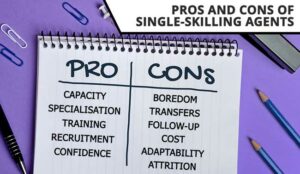When faced with delivering so many different channels and services, it can feel like your only option is to multi-skill your agents and expect everyone to get involved in everything – but this isn’t always the right choice for your agents and customers.
That’s why we asked our consultants panel to explain the pros and cons of single-skilling agents, so you can make an informed choice for your contact centre.
Here’s what they said…
The Benefits of Single-Skilling Your Agents
More Capacity to Deal With Unprecedented Demand

A hidden benefit of single-skilling, which may be less obvious, is for those who need flex in capacity. I experienced this first-hand when working with an airline client.
Our teams were single-skilled, so when the unexpected happened (a small volcanic eruption issue in Iceland!), we had more capacity to deal with unprecedented demand and therefore delivered a better level of answer rates and customer service than our competitors.
Contributed by: Neville Doughty, Partnership Director, Contact Centre Panel
Highly Specialized Areas (Like Healthcare) Require More Expertise
I am a supporter of multi-skilling (to a reasonable extent) UNLESS there is a highly specialized area that requires more expertise, such as healthcare or emergency services.
Single-skilling can be useful for maintaining high-quality service in areas that demand specialized attention and consistent performance.
Contributed by: Irina Mateeva, WFM Transformation Consultant and Founder of RightWFM
De-Skilling Agents Improves the Quality of Your Training and Recruitment Efforts

As a leadership team, we decided to trial de-skilling a small team to see what the impact would be – and the results were outstanding.
Colleague engagement increased, the quality of training was vastly improved, shift patterns became easier to plan and manage, and ultimately CSAT improved tenfold!
This also had a great impact on recruitment, as we were able to segment colleagues into their preferred area of the operation and recruit for talent in a specific area.
With that in mind, we decided as an Ops Team to roll out the programme and even won a highly coveted Forum award for ‘Customer Contact Innovation – Entrepreneurial Culture’.
Needless to say, the operation flourished as a result and that’s why I’m a massive advocate of single-skilling.
Contributed by: Jim Oldroyd of Bread and Butter Learning Solutions
Single-Skilling Helps Get New Employees Off to the Best Start

Single-skilling is a good starting point to introduce new employees to your contact centre as a part of their learning curve and onboarding journey.
A good skilling strategy consists of topic-based training that allows agents to build confidence in one subject matter – before exposing them to additional responsibilities.
Contributed by: Irina Mateeva, WFM Transformation Consultant and Founder of RightWFM
Single-Skilling Makes Customers Feel Like They Are Dealing With a Specialist – Not a Generalist
By the time most customers contact you, they themselves have already become generalists – they’ve probably looked at your website or interrogated the app, reviewed FAQs and tried to self-serve.
That’s why ensuring that your agents are properly skilled in one area, so that your customers feel that they are dealing with a specialist, has benefits in ensuring that queries are resolved first time, repeat contacts are avoided, and customer satisfaction is maintained.
Contributed by: Neville Doughty, Partnership Director, Contact Centre Panel
The Downsides of Single-Skilling Your Agents
Higher Levels of Agent Boredom

Boredom and monotony can significantly affect employee morale in a single-skilling working environment.
By contrast, multi-skilling introduces variety into agents’ daily tasks, making their roles more engaging and less repetitive.
It also provides, in some instances, some relief from the complexity and cognitive overload that one channel (such as voice) can bring, so gives agents the opportunity to take a break.
Contributed by: Garry Gormley, Founder of FAB Solutions
The Customer Experience Is Compromised When Inbound Teams Can’t Follow Up When They Need To

In my experience, multi-skilled agents are most effective for a wide range of industries and workflows.
Let me share an example from a previous company, where we initially had rigid, channel-segregated departments…
Inbound teams only handled inbound calls, outbound teams focused on sales, and a digital team managed emails and chat/SMS.
The problem? The inbound team often needed to follow up with customers but didn’t have the opportunity because of having no outbound or email functionality.
The outbound team’s customers would often call back in and be handled by the inbound team – leaving the outbound agents demotivated. Overall, it wasn’t the best journey for the customer in most cases either.
Contributed by: Alex McConville, Founder, Contact Centre Consultant and author of ‘Diary of a Call Centre Manager’
Customers Hate Being Transferred to Another Queue

Last year, I called an online retailer for help with a computer I recently bought from them.
I got transferred to three different agents during that single call. Each time, I had to explain why I was calling only to hear they could not help me. So, I returned the product.
Multi-skilling agents equips them to handle different types of enquiries, so they do not have to transfer customers from queue to queue. That reduces customer effort and frustration.
That is especially important if you offer more than one product or service line-up. If a customer can use more than one of your products or services at a time, you owe it to them to get help for those products/services from a single agent, if possible.
Contributed by: Mike Aoki, President, Reflective Keynotes Inc.
The Cost of Running the Service Is a Little Higher
When you’re not leveraging the shrinkage savings that multi-skilling can deliver, the cost of running the service is a little higher and, as a result, single-skilling needs to be considered carefully.
Contributed by: Neville Doughty, Partnership Director, Contact Centre Panel
It’s Difficult to Adapt to Sudden Changes in Workload Distribution

Single-skilling limits operational flexibility, making it difficult to adapt to sudden changes in workload distribution or emerging service needs.
This rigidity can result in suboptimal resource allocation and increased operational costs over time.
Contributed by: Dan Pratt, Founder & Director DAP Consultancy
There’s Higher Agent Turnover When the Contact Centre Is Seen as a Short-Term Job

When single-skilling your agents, you’re likely to see limited agent retention due to restricted development.
In short, if you’re not prepared to provide development opportunities which are easily within your power, and instead focus on a short-term solution with single-skilled agents, the agents will react in the same manner!
They will then view the contact centre as a short-term solution on their career path and move on.
This will add to higher attrition and increased training for new hires too, which in time will be more time-consuming and inefficient in comparison to investing initially in the long-term goal.
The result will be less competent agents.
Contributed by: Dara Kiernan, leadership development and contact centre consultant
If you want advice on calculating your attrition rate, read our article: What Is Attrition Rate and How to Calculate It
There’s a Time and a Place for a Single-Skilling Strategy
Despite some evidenced downsides, what’s clear is that there are times when a single-skilling strategy is the best option – particularly when managing niche enquiries in healthcare and/or emergency services, and onboarding agents without overwhelming them.
Ultimately you must decide what’s best for your agents and customers and, as every contact centre is different, it makes it all the more important to do your research first.
If you are looking for more information on single-skilling or multi-skilling your contact centre agents, read these next:
- Multi-Skilling Agents – Is It Really Best?
- Should We Multi-Skill or Single-Skill Our Advisors?
- 20 Tips to Multi-skill your Contact Centre
- How Do I… Manage and Schedule Multi-skilled Agents?
Author: Megan Jones
Reviewed by: Xander Freeman
Published On: 20th Aug 2024 - Last modified: 18th Sep 2025
Read more about - Call Centre Management, Alex McConville, Dan Pratt, Dara Kiernan, Garry Gormley, Irina Mateeva, Jim Oldroyd, Management Strategies, Mike Aoki, Multi-Skilling, Neville Doughty, Skill Development, Top Story, Training and Coaching















